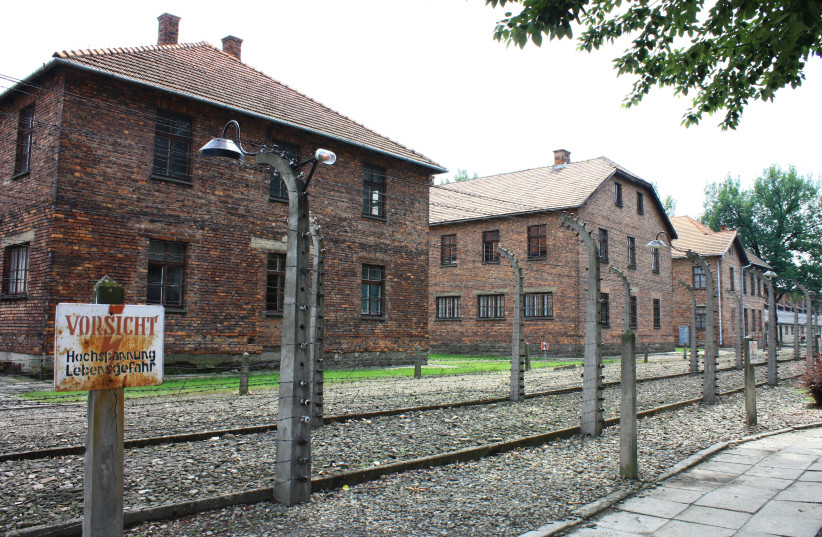BERLIN – Young people in America have spring break, French kids have the long vacation and Israeli teens have – trips to Auschwitz.
Israeli high schoolers are known to party hard on these school-sponsored and supervised visits to Poland to visit Holocaust memorial sites, and a new movie, Delegation, by Asaf Saban, that dramatizes one of these trips, premiered at the Berlinale, the Berlin International Film Festival, this week.
The movie was greeted with enthusiasm by a huge audience at the Zoo Palast theater, few of whom were Israeli, so clearly the director was able to make this quintessentially Israeli story relevant to foreign audiences, which is an impressive accomplishment. Seeing it in a German setting was especially apt. I will write a complete review of the film when it opens in Israel later this year, but what follows are some thoughts raised by the movie.
The bizarre juxtapositions and contradictions that are part of these trips are fertile ground for a filmmaker, and Saban makes the most of the subject. While teens around the world go on school trips every year, Israelis are prepped for this journey into Jewish tragedy from a very young age.
Even preschool students must be given an explanation for the sirens that sound on Holocaust Remembrance Day, so by the time they arrive in Poland, they know a great deal about the subject.

These trips aren’t really about expanding their knowledge, although no doubt they learn many facts along the way, but about eliciting an emotional reaction from them, one that will make them feel solidarity with their people and internalize the need for a Jewish state, just as they are entering the army.
There are two inherent problems in this approach, and the movie does an excellent job of dramatizing them both. One is that there can be a certain type of emotional manipulation on these trips. As Delegation shows, after visiting various concentration camps and other memorials during the day, the group sits and discusses their reaction at night.
In these sessions, there can be pressure for them to express emotions that they may not have felt, to manufacture some kind of catharsis that they can articulate on cue. In one of the group scenes, a boy says that seeing the horrors perpetrated on Jews has strengthened his desire to join an elite combat unit in the army, while another girl speaks tearfully about the moment at a memorial when she felt at one with the victims.
These are the kind of responses the trips are designed to elicit, but those who don’t react in these prescribed ways are pushed and perhaps made to feel inadequate. While it isn’t mentioned explicitly in the movie, the fact that these trips are not cheap (they often cost NIS 6000 or more) may intensify the pressure on them.
Horrors of the Holocaust
THE OTHER strange aspect of the trips is that while their purpose is to connect these kids to the horror of the Holocaust, they take place at a moment in their lives when, for many, their primary focus is on sex, romance, drugs and partying in general, as soon as they are away from their parents. Who is dating whom, who managed to buy liquor at the duty-free and sneak it in, etc. are on their minds at the same time they are learning about Treblinka and Auschwitz, which makes for some black comedy on the way.
The movie focuses on three friends who are sorting out their relationships, played by Yoav Bavly, Leib Lev Levin and Neomi Harari, who give very natural performances and seem like real high-school kids. Alma Dishy is very good as their increasingly unhinged teacher, who has a tough time reigning them in and sticking to the program.
But the jewel in this movie is the veteran actor Ezra Dagan, who appeared in Schindler’s List, who plays the Holocaust survivor grandfather of one of the trip participants, and is there to give first-hand testimony. He starts off telling charming, personal stories of how the Nazi regulations against Jews began to affect him but is urged to hurry up and get on with it, to get to “the action,” as he puts it wryly.
The writing in his scenes is especially strong, and I was moved by the fact that he wanted to tell his very idiosyncratic story but was pushed to be a kind of generic victim. When they arrive at Auschwitz he is overcome by emotion and cannot talk, but his silence speaks volumes and Dagan plays this beautifully.
Israelis likely will have strong reactions to this film, but it was interesting to see that an international audience in Berlin found it compelling and could identify with the crazy contradictions in the story.
